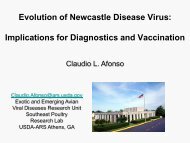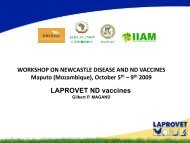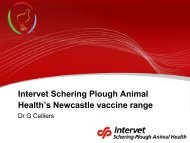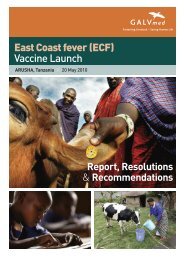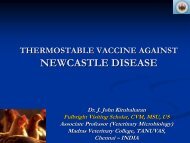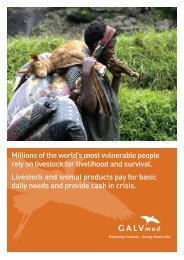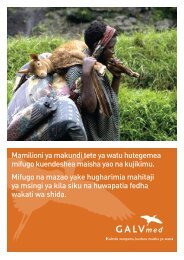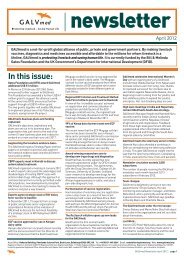A Path to Prosperity New Directions for African Livestock
GALVmed Impetus Strategy Paper
GALVmed Impetus Strategy Paper
- No tags were found...
Create successful ePaper yourself
Turn your PDF publications into a flip-book with our unique Google optimized e-Paper software.
Annex 2<br />
The Voices of Lives<strong>to</strong>ck Keepers<br />
It can be difficult <strong>to</strong> represent lives<strong>to</strong>ck keepers’ views<br />
adequately. AU/IBAR captured the views of lives<strong>to</strong>ck<br />
owners on video <strong>for</strong> a 2002 conference on Primary<br />
Animal Health Care in the 21st Century: Shaping the<br />
Rules, Policies and Institutions 14 . Here are some of<br />
the responses.<br />
The key questions asked were:<br />
> What kinds of veterinary service do you have<br />
at the moment?<br />
> What kinds of veterinary service do you want?<br />
> How do you feel about paying <strong>for</strong> services?<br />
In West Pokot, Kenya and Mulu, Ethiopia,<br />
community-based animal health programmes had<br />
been established. In these places, people were also<br />
asked how they felt about these programmes.<br />
Kajiado, Kenya (less than 100 km from Nairobi)<br />
“The only time I see government<br />
veterinary services is during vaccination<br />
campaigns. Otherwise they are<br />
nowhere <strong>to</strong> be found. When an animal<br />
is sick, it’s very hard <strong>for</strong> me <strong>to</strong> know<br />
how <strong>to</strong> use a drug. When there is<br />
nobody <strong>to</strong> ask and nobody <strong>to</strong> help, I just<br />
take a risk and assume this amount of<br />
drug is enough, and I do it myself.”<br />
Kati, Mali<br />
“The government veterinary service is<br />
not effective because it cannot s<strong>to</strong>re<br />
enough drugs <strong>to</strong> treat our animals.<br />
But some of us have learnt the basic<br />
things, like some treatments and<br />
vaccination, so there is no problem at<br />
that level. Even me, I know how <strong>to</strong> do<br />
some of it.”<br />
“I’m convinced that if you could train<br />
someone <strong>to</strong> be a paravet, who would<br />
be well trained in our community and<br />
know how <strong>to</strong> use drugs properly, we<br />
would pay. This is precisely what we<br />
are asking <strong>for</strong>. We need these<br />
veterinary workers <strong>to</strong> be well<br />
equipped and close <strong>to</strong> us. It is<br />
proximity that is important <strong>to</strong> us.”<br />
Baringo District, Kenya (150 km north of Nakuru,<br />
Kenya’s second largest <strong>to</strong>wn)<br />
“A long time ago, vets used <strong>to</strong> come but<br />
now they don’t. By the time you’ve found<br />
one the cow is dead. If a cow gets sick<br />
you have <strong>to</strong> go asking around <strong>for</strong> the<br />
medicine. Then you get the medicine<br />
and inject it. Sometimes it heals and<br />
sometimes it kills. What can we do?”<br />
The Impetus Strategy Paper I Page 60<br />
Mulu, Ethiopia<br />
“Maybe once in a year vets came from<br />
the agricultural bureau on some field<br />
trip and treated a few animals. Other<br />
than that we just see the animals<br />
die.”<br />
“Our life depends on animals. These<br />
diseases kill them and make them<br />
sick. If we need a vet, well, we live in<br />
areas like this! We can’t get transport<br />
<strong>to</strong> <strong>to</strong>wn and it’s difficult <strong>for</strong> us <strong>to</strong> drive<br />
sick animals there. But since the<br />
community animal health worker<br />
started working, they come <strong>to</strong> us.<br />
There has been a great<br />
improvement.”<br />
“Be<strong>for</strong>e these people were trained,<br />
we used <strong>to</strong> lose a lot of animals at the<br />
time of disease outbreaks. But now<br />
we are better – the community animal<br />
health workers are here.”<br />
West Pokot, Kenya<br />
“Be<strong>for</strong>e, there was a big problem.<br />
Government officials used <strong>to</strong> come<br />
maybe once a year and vaccinate, and<br />
then vanish. Sometimes they wouldn’t<br />
even vaccinate all the animals be<strong>for</strong>e<br />
they disappeared. When we started<br />
selecting and training these<br />
community animal health workers,<br />
that’s when we started seeing some<br />
light. If you call the community<br />
animal health worker, it means that<br />
you’re prepared <strong>to</strong> pay <strong>for</strong> the<br />
treatment. Everyone is aware that<br />
these drugs are not free of charge –<br />
everybody is paying <strong>for</strong> it. It has been<br />
agreed – no free treatment. That’s<br />
what we are fighting <strong>for</strong>.”<br />
“Be<strong>for</strong>e the community animal health<br />
worker came, there used <strong>to</strong> be a lot of<br />
diseases in this area, affecting the<br />
cattle, the goats, all the lives<strong>to</strong>ck. But<br />
since he came, the disease situation<br />
has improved.”<br />
“Since the community animal health<br />
worker came, he has done well.<br />
We’ve not had any problem from him.<br />
We drink milk and eat good meat.<br />
When the calves are born, they are<br />
active and healthy.”<br />
14 http://www.eldis.org/fulltext/cape_new/MombasaProceedingsEnglish.pdf



